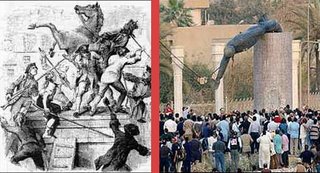
It's just the way it is.
I'm assuming you've already read the prior posting. If not, this is a two part series and you'll need to back up one post before reading this. I've timed this and you'll need 15-20 minutes to read. I typically don't write about politics but today I will because this has been on my mind for too long.
Did you think my story is what history will record about todays war in Iraq? Did you think it sounded like the war we presently are fighting? It did for me when the other day I began to do a little reading. The surprise is I was brushing up on the history of my country, the United States of America. You see the war I just described is the American Revolutionary War. My story was taken from the records of our history books.
The reason I was brushing up on it was motivated by an asinine comment made by Madeline Albrecht, a former Secretary of State, during a television interview I'd come across on the Comedy Channel. I should have known right there by the very nature of where she had landed on my dial, this woman is a joke. Anyway, in an effort to sell her latest book, she chided in with the "unpopular war" commentators and the "this shouldn't be our war" crowd as she made the following ignorant statement. "You can't spread democracy with the barrel of a gun." Hmmmmmm! Really? And just how, Ms. Albrecht, did you acquire the freedom to make that statement?
Similar wars with similar causes.
It all happened with relative similarities.
The Cause:
This is the story of people in pursuit of independence from a government that stifled freedom. Although Britain was not torturing or systematically killing its citizens, it was governing with a strong arm and a choking presence as they refused to allow the new American colonies to self govern. That refusal eventually took the form of military force. The Brits had also been pursuing control of other regions of the world which was indicative of a government with an appetite. Both Britain and Iraq attempted to expand their empires by use of force. American's and Iraqi citizens wanted freedom. Regardless the reason that got us there, we've ended up helping the Iraqi's strive for theirs. In the scheme of the bigger picture, I think that's good.
The Approach:
During the early 1770's, Americans withheld paying taxes to Britain's throne as they were becoming increasingly unhappy with high taxation and the loss of individual freedoms. People's homes and property could be searched without cause and without representation and we were being taxed more and more. In essence, the colonists placed economic sanctions on Britain in an effort to make a political statement. In other words, just as we did with Saddam Hussein, we tried diplomacy and sanctions first. As political efforts failed, we eventually had to decide how much we were willing to pay for freedom. Britain tried to dissolve our attempts at sovereignty and eventually took up arms to force their will. It soon became evident that the cost of the American Revolution would include bloodshed and the rest is history.
The Coalition:
During the American Revolutionary War our soldiers did not fight alone in an effort to win sovereignty and freedom for America's 13 colonies. While Britain fought to keep their kingdom in control, they found themselves up against more than just our soldiers; they also had to fight a coalition of our citizens. You see, our newly formed army fought along side a collection of American militia as well as faced enemy militia who sided with Britain. Today in Iraq you'll find their newly formed army also includes Iraqi militia as well as faces militia still loyal to Saddam's dictatorship. Although poorly trained, these militia in both cases were willing to adapt and formalize and the freedom fighters eventually played a big part in the revolution.
The coalition also included outsiders. They were the armies of France, Spain, the Dutch empires and the Netherlands. Also, included on both sides of the revolution were Canadian and American Indians along with a small number of Americans and black slaves loyal to the crown. I'm sure this made it difficult at times to recognize the enemy which is a common theme lately in our news from Iraq.
The Learning Curve:
Just as in Iraq, we made mistakes during the revolutionary war that jeopardized the safety of the American soldier. Comparable to the issue of inadequate armored vehicles, the American revolutionary soldier was also vulnerable. For example, General George Washington, in 1777, put out the word for 400 select Virginia riflemen to advance toward the Hudson River in an effort to stop the British. During the battle of Saratoga these sharpshooters were accurate at well over 200 yards but suffered losses from their long reload times and their lack of bayonets which were needed when the enemy would advance. This meant we initially lost many of these soldiers in combat. The commanders and soldiers eventually learned to mix the sharpshooters with trained men armed with muskets and bayonets to protect them. In other words, added armament was needed and adaptations were made.
The Insurgents:
In both the revolutionary war and in Iraq, American soldiers faced insurgents. During the revolution they were the Tories, Indians, and German mercenaries that came from within and from outside our country. These insurgents were financed by the opposition just as the insurgents we face today are. Although methods of warfare differ, the formula for war has been somewhat predictable when you read our history.

